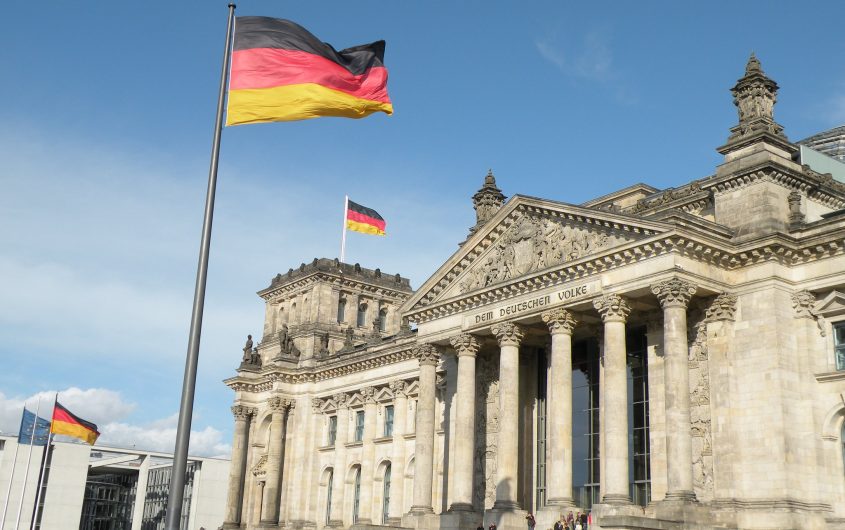
Nick Perretti via Flickr
Why the German Paradigm Shift on Russia Is (Probably) Bound to Last

Jonas J. Driedger
Paul H. Nitze School of Advanced International Studies (SAIS), Johns Hopkins University
Dr. Jonas J. Driedger is a DAAD Postdoctoral Fellow at the Kissinger Center for Global Affairs at the Paul H. Nitze School of Advanced International Studies (SAIS), Johns Hopkins University. At SAIS, Dr. Driedger researches transatlantic options for stability in the neighborhoods of Russia and China. He specializes in the causes of peace and conflict between major military powers and their less powerful neighbors, conflict-averting policy options of third states, the politics of regime survival, deterrence, “hybrid” conflict measures and security cooperation in international relations, with a regional focus on Russia and its relations to its neighboring states, Europe, and the United States.
Mr. Driedger was a Doctoral Researcher at the European University Institute in Florence, Italy. In his dissertation, he assesses the causes of peace and armed conflict between major powers and nearby states with inferior military capabilities. A College of Europe graduate, he was an Alfa Fellow and Visiting Researcher at the Moscow Higher School of Economics. He taught and did fieldwork in Germany, Italy, Ukraine, and Russia. Apart from his academic publications, Jonas contributed analyses and policy advice in German, Russian, and English, including to the George C. Marshall European Center for Security Studies, the Oxford University Changing Character of War Centre, Politico Europe, The National Interest, EUObserver, and EurActiv. His recent article, "Will Russia intervene in Belarus?" was published by the EUIdeas blog.
During his fellowship, Jonas investigated how the Trump presidency had affected U.S.-German security cooperation toward Russia. Were the bitter exchanges between Donald Trump and Angela Merkel indicative of a rapidly widening divergence on Russia? Trump expressed sympathy for Russian president Vladimir Putin, while Merkel, upon Trump’s electoral victory, called for European “strategic autonomy” and made future transatlantic cooperation contingent on adherence to fundamental values. Alternatively, one might well have asked whether these bitter public exchanges covered up that, at the policy level and between key mid-tier policymakers, there was little to no change in how the two countries cooperated toward Russia. These questions were particularly urgent, as Russian conduct was unlikely to become less aggressive. Recent constitutional reforms cemented Putin’s domineering position over Russia and the Kremlin continued assertive policies in Syria, Ukraine, and Western domestic affairs. With the United Kingdom having left the European Union, and France largely focused inward and toward Africa, the United States and Germany emerged as the key linchpin of effective Western policy toward Russia. Managing this relationship well required a thorough understanding of how the Trump presidency had affected it, and what the likely effects of the 2020 elections would be.
The DAAD/AICGS Research Fellowship is supported by the DAAD with funds from the Federal Foreign Office.
When Russia invaded Ukraine on February 24, German Chancellor Olaf Scholz announced a Zeitenwende—a “change of times.” The term entails the double meaning of an era ending and a paradigm shifting. Another fitting term is revolution, as AGI President Jeff Rathke has termed Berlin’s new approach: Germany, long considered both the most important and least reliable NATO ally when it comes to the Kremlin, has drastically reconfigured the three pillars of its Russia policy.
First, on February 26, Germany finally ended its long-standing policy of not allowing German-manufactured weapons to be sent to Ukraine. Germany is now set to deliver 1,000 anti-tank weapons and 500 surface-to-air missiles to Kyiv.
Second, on February 27, in an emergency meeting of the German Bundestag, Scholz announced Germany would create a special fund for its armed forces—to the tune of 100 billion Euros—and raise Germany’s annual defense spending above the NATO threshold of two percent of gross domestic product. This, again, came after years of allied pressure and Germany lagging well below one and a half percent.
Third, on February 22, Germany announced it would freeze certification of the Nord Stream 2 pipeline system. This was again a major reversal of German policy. Berlin had long resisted immense pressure from its allies and long refused to cancel Nord Stream 2. Just as the long-operational original Nord Stream, this pipeline system would allow Russia to circumvent the Ukrainian transit corridor and deliver gas straight to Germany and other European countries. Many had argued that, via the Nord Streams, Germany was willing to starve Ukraine of desperately needed transit fees to ensure cheap energy prices, avoid Russian energy embargoes, and make sure that renewed conflict between Ukraine and Russia would not endanger German energy supplies.
This dramatic shift in German policy forces reconsideration of three conventional wisdoms about the drivers of Germany’s Russia policy.
First, German dependency on Russian gas has less political impact than often assumed, as has been argued before by many, including this writer. The Nord Stream pipelines indeed ensure continued supply from Russia at the expense of one of Ukraine’s few deterrent assets (i.e. the ability to cut off Russian gas supplies to the West, hurting the Kremlin economically and forcing Western Europe’s hand). Nonetheless, Germany ultimately decided to withhold certification of Nord Stream 2 on February 22—exactly when energy prices were extremely high, when Russia was about to invade Ukraine, and when delivery interruptions were most likely.
Second, and relatedly, while Germany is without a doubt a geo-economic power, politics can and do trump economics in Berlin. While Germany is the world’s fourth-largest arms exporter and saw record sales in 2021, it long withheld sending arms to Ukraine, which has been a profitable market since the start of the Ukraine crisis in 2014. Scholz’s announced increases in defense spending show that Germany is willing to forego prosperity for security.
Third, German security culture is not neutralist and pacifist. History and culture, unsurprisingly, have conditioned today’s Germans to abhor war and favor multilateral diplomacy. But exactly these traits ensure that the more Russia is seen as a driver of war and unilateralism, the more robust German policy is bound to get.
When Russia annexed Crimea and ignited a proxy war over Donbas in 2014, it emerged as a culprit in the eyes of the German elite and population. Consequently, Germany became one of the driving forces behind European sanctions against Russia and renewed deterrence efforts in the Baltics, including the unprecedented sending of combat troops to NATO-allied Lithuania. Germany’s approach remained consistent even when that of the United States became erratic during the Trump presidency.
Indeed, the perception of the Russian regime as the clear aggressor against Ukraine was a major cause of the dramatic shift in Berlin’s stance this year.
Just before the start of the invasion, a majority of German respondents were against sending weapons to Ukraine. However, right after Russia attacked, a majority disapproved of the government’s handling of the crisis. German policy changed accordingly.
Furthermore, nearly half of German respondents had seen Russia as a danger for international peace just before the start of the invasion—over three quarters right after. The German elite is equally unanimous. Even representatives of the most Kremlin-friendly parties Die Linke and Alternative für Deutschland condemned the attack.
The invasion in early 2022 hence solidified German perceptions of Russia as an aggressive and dangerous unilateralist and consequently led to an even more robust policy than since 2014, where Germany had not put the Nord Stream 2 project on the line.
But is this paradigm shift here to stay? Some Germany observers have rightfully pointed to the many practical challenges involving realization and implementation, while others doubt that Germany will deliver at all. However, several reasons suggest that, yes, Germany is bound to stay its new course on Russia.
The German paradigm shift on Russia fits into a broader pattern of German foreign policy. Usually, foreign policy does not rank high on Berlin’s priority list. Hence, German governments tend to continue whatever approach is in place and focus on domestic affairs.
As Dan Hamilton has pointed out, only crass external events become genuinely political, drastically change perceptions, and force Berlin to put into place a new approach. For example, the Financial Crisis 2008/09 caused Germany to oversee a major rehauling of financial and economic policy within the EU. Wide-spread German skepticism against nuclear power was massively strengthened by the Fukushima nuclear disaster of 2011, causing Germany to opt out of nuclear power.
After externally caused shifts, German foreign policy tends to remain firmly in place. This is in part because Berlin intuitively seeks to enshrine its own preferences in multilateral frameworks, prominently within NATO and the EU.
It is unlikely that German perceptions of Russia as a dangerous aggressor and violator of international law will change any time soon.
This would again require a radical change, such as a mutually agreeable peace settlement with Ukraine or serious changes in the Russian power structure. Of course, such changes are unlikely to occur any time soon.
Furthermore, party politics favor the status quo. German foreign policy is made by committee. Key ministries enjoy wide autonomy and are held by members of three different parties that jointly form a ruling coalition: Chancellery and Defense are with the SPD, Foreign Affairs and Economy with the Greens, and Finances with the FDP. As all these parties compete for the political center, existing policies tend to win out.
Of course, with events unfolding so rapidly, any clear-cut prediction is precarious. Nonetheless, all current signs point to persistence. Germans likely will continue to perceive Russian actions as blatant and destabilizing aggression, akin to Hitler’s phony pretexts when invading Poland in 1939. Coalition politics and Germany’s multilateralism further insulate the new approach. With simultaneous pressure from the allies, Germany will likely double down on EU and NATO efforts to organize a common front against Russia and support Ukraine.
The German way of foreign policy, if it can be called that, is slow, reactive, not too strategic, and militarily cautious. But it also emphasizes momentum, continuity, institutions, multilateral efforts, and the rule of international law. The Kremlin might have caused itself a bigger problem than it bargained for. And Ukraine may now find a much stauncher ally in Germany than expected.









